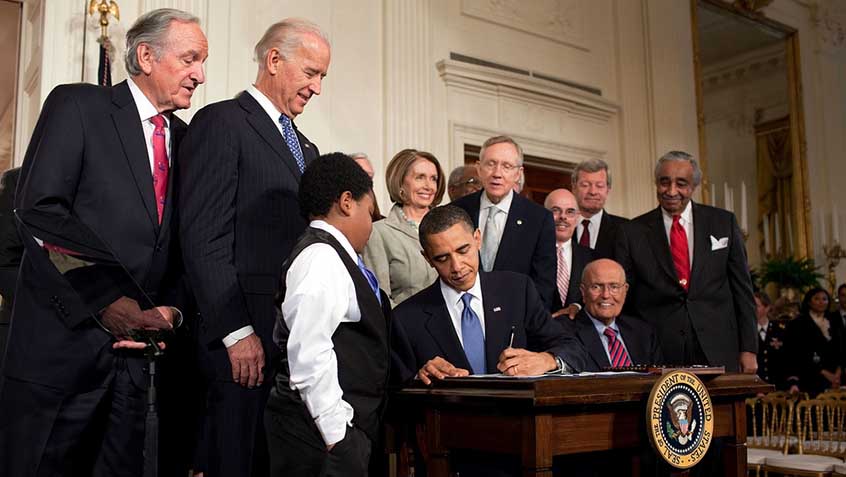Join Us Live for a Discussion on Medicare, Democracy, and the Future of Health Care
Affordable Care Act After Six Years: Medicare is Stronger and 20 Million More Are Insured

Six years ago, the Affordable Care Act (ACA) was signed into law. Through new health insurance Marketplaces and the expansion of Medicaid, 20 million uninsured Americans have gained health coverage since 2010. Alongside these historic reductions in the number of uninsured, the ACA also made many important improvements to Medicare. On this sixth anniversary of the ACA, we reflect on three key ways the ACA strengthened Medicare:
- Lower prescription drug costs for seniors and people with disabilities: The Centers for Medicare & Medicaid Services (CMS) reports that 10.7 million people with Medicare have saved over $20.8 billion on prescription drugs since 2010—averaging $1,945 per beneficiary. The ACA is gradually closing the Medicare Part D coverage gap (more commonly known as the doughnut hole). In the doughnut hole, people enrolled in a Part D prescription drug plan were responsible for the full cost of their medications. By the year 2020, the doughnut hole will be closed.
- Innovations in how care is paid for and delivered: The ACA established the Centers for Medicare & Medicaid Innovation (Innovation Center)—an entity charged with testing new ways to deliver better quality care at a lower cost. Several demonstrations are underway through the Innovation Center to improve care for people with Medicare, such as through value-based insurance design and enhanced medication therapy management. Most recently, the Innovation Center proposed a demonstration to change how providers are reimbursed for medications administered by a physician, covered under Medicare Part B.
Common Part B prescription drugs treat cancer, macular degeneration, anemia, and arthritis. Part B medications tend to be very costly—in 2013, Medicare and its beneficiaries spent $19 billion on Part B prescription drugs. The proposed demonstration is designed to ensure that people with Medicare receive the most cost-effective Part B medications available. The program will not only alter reimbursement, it will also test ways to promote smarter prescribing among physicians, lower or eliminate cost sharing for high-value treatments, and more.As a long-time advocate for solutions to lower the cost of Part B medications, Medicare Rights supports the proposed demonstration and will provide comments to the Innovation Center on how to proceed with testing to ensure that beneficiaries continue to receive the treatments best suited to their needs.
- Access to low-to-no cost preventive services and screenings: Thanks to the ACA, people with Medicare are benefiting from access to preventive health care screenings with no coinsurance or deductible. In 2015, more than 39.2 million Medicare beneficiaries utilized at least one no cost preventive screening. Examples of these services include bone mass measurements, colorectal screenings, depression screenings, smoking cessation, mammograms, and more. Medicare Rights encourages all people with Medicare to take advantage of these important services, bearing in mind that deductibles, coinsurances, or copayments may apply for any diagnostic care received during the same doctor’s appointment.
These are only three reasons to celebrate the ACA, but the list goes on and on! People all over the country are honoring the sixth anniversary of the ACA and the continued strength of the Medicare program. See what some are saying on Twitter:
Six years. #20MillionStrong. Progress we must continue to build on. #ACAanniversary pic.twitter.com/zykH3fN7J3
— Sylvia Burwell (@SecBurwell) March 23, 2016
BIG NEWS: perfect @ACA 6th anniv commemoration. Diabetes prevention, affecting so many, is certified for Medicare. https://t.co/6mr8OzYjHy
— Andy Slavitt (@ASlavitt) March 23, 2016
#Obamacare at Six: Explore views on #ACA over time by race, party ID, income and more https://t.co/fNzsnfthoS pic.twitter.com/eoHtbYsSll
— Kaiser Family Found (@KaiserFamFound) March 23, 2016
Thanks to the #ACA, no one can be denied coverage because of a pre-existing condition. That’s a thing of the past. #ACATurns6
— U.S. Surgeon General (@Surgeon_General) March 23, 2016
Thanks to the #ACA, 20 million people have gained health insurance. Uninsured rate is <10% for the first time ever. pic.twitter.com/xjjf2F9BkY
— Jason Furman (@CEAChair) March 22, 2016
Show Comments
We welcome thoughtful, respectful discussion on our website. To maintain a safe and constructive environment, comments that include profanity or violent, threatening language will be hidden. We may ban commentors who repeatedly cross these guidelines.
Help Us Protect & Strengthen Medicare
Donate today and make a lasting impact
More than 67 million people rely on Medicare—but many still face barriers to the care they need. With your support, we provide free, unbiased help to people navigating Medicare and work across the country with federal and state advocates to protect Medicare’s future and address the needs of those it serves.
The Latest
Most Read
Add Medicare to Your Inbox
Sign up to receive Medicare news, policy developments, and other useful updates from the Medicare Rights.
View this profile on InstagramMedicare Rights Center (@medicarerights) • Instagram photos and videos









